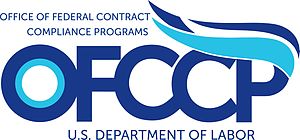
The United States Department of Labor’s Office of Federal Contract Compliance Programs (“OFCCP”) is updating its rules for evaluating compliance by federal government contractors with equal employment opportunity laws. On December 27, 2019, OFCCP issued a Notice of Proposed Rule Making (“NPRM”), which can be found here: OFCCP NPRM. According to a Press Release, the purpose of the NPRM is to “provide federal contractors with greater certainty and transparency about the procedures that OFCCP follows during compliance evaluations to resolve employment discrimination and other material violations.”
This is good news for federal contractors because the new rules will make some aspects of an OFCCP compliance evaluation mandatory. Typically, evaluation procedures are guided by OFCCP’s Federal Contract Compliance Manual (“FCCM”). Yet, the agency makes clear that the FCCM “does not establish substantive agency policy.” In other words, OFCCP can depart from the FCCM without violating the law. The FCCM can be found here.
The proposed rule making clarifies the circumstances in which OFCCP will issue a Predetermination Notice (PDN) of discrimination to contractors. If OFCCP finds an employment or compensation disparity during a compliance evaluation, it will determine: (1) if that disparity is “both practically and statistically significant”; and, (2) where relevant, whether nonstatistical evidence demonstrates an intent to discriminate. If OFCCP cannot corroborate statistical evidence with nonstatistical evidence, it will issue a PDN only where the statistical evidence is significant at a confidence level of 99% or higher, which equates to three or more standard deviations. Currently, OFCCP pursues compensation audits based solely on statistically-significant disparities below this threshold.
So, the NPRM is good for employers because it limits the circumstances in which OFCCP will rely solely upon statistical evidence to make a predetermination finding of potential discrimination. But, the NPRM also clarifies the types of nonstatistical evidence OFCCP will rely upon to bolster statistics that, on their own, would not warrant a PDN.
Nonstatistical evidence may include testimony about biased statements, remarks, attitudes, or acts based upon membership in a protected class; differential treatment through review of comparators, cohorts, or summary data reflecting differential selections, compensation and/or qualifications; testimony about individuals denied or given misleading or contradictory information about employment or compensation practices; testimony about the extent of discretion or subjectivity involved in making employment decisions; or other anecdotal or supporting evidence.
This portion of the NPRM is not as favorable for contractors. It provides no standards on how OFCCP will weigh any particular type of nonstatistical evidence. Moreover, by including “discretion or subjectivity” in its definition of nonstatistical evidence, OFCCP is implicating the vast majority of employment decisions. Almost every hiring or promotion decision relies, in some part, on discretion or subjectivity by the decision maker.
If OFCCP issues a PDN to a contractor, the contractor must respond within 15 calendar days unless OFCCP grants an extension “for good cause.” That is a short window to respond. If the contractor does not respond or provide a “sufficient response,” OFCCP may issue a Notice of Violation (NOV). If OFCCP issues a NOV, it may offer the contractor the opportunity to enter into a conciliation agreement. That agreement “shall provide for such remedial action as may be necessary to correct the violations and/or deficiencies noted, including, where appropriate (but not necessarily limited to), remedies such as back pay and retroactive seniority.”
Finally, OFCCP’s proposed rule includes an “expedited conciliation option.” Under that option, a contractor can enter into a conciliation agreement before OFCCP issues a PDN or NOV. Compliance evaluations and responses to PDNs can be extremely costly in terms of time and money. The expedited conciliation option will provide contractors a procedure to remedy compliance issues without as much time or expense.
OFCCP is accepting public comments on the NPRM through January 29, 2020. Instructions for submitting a comment can be found at this link: OFCCP Comments



